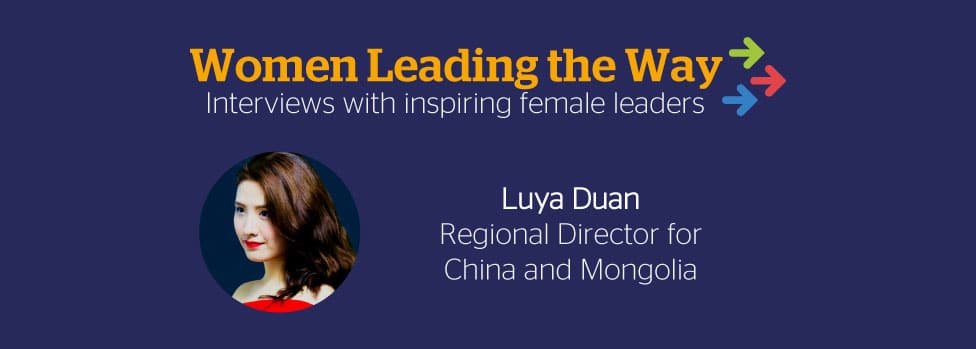WOMEN LEADING THE WAY: AN INTERVIEW WITH LUYA DUAN, REGIONAL DIRECTOR FOR CHINA AND MONGOLIA AT OXFORD INTERNATIONAL

From the launch of our Women Leading the Way series, we received a lot of great comments and are excited to share our stories as we continue to drive our CARE initiative forward. For our second interview with female leaders in the education sector, we sat down with Luya Duan, Regional Director for China and Mongolia at Oxford International. We discussed what she thinks about the BBC’s recent report that Firms with more female executives ‘perform better’, gender diversity and ask her advice as a female leader.
Luya is a highly experienced director in the delivery of institutional commercial and operational strategies in Asian regions. Over the last two years, she has been leading Oxford International’s strategic developments in China, driving University Partnerships’ growth with a high performing regional team, and she recently completed a Masters in Business Administration at the University of Cambridge.
The BBC recently reported that companies with better gender diversity at Executive level perform better, why do you think that is?
Organisations ultimately benefit from the talented individuals who work for them – talents who create great products, who innovate, who drive fantastic marketing and sales, and so much more. However, top talents are always scarce. Compared to a board with only male leaders, a gender-diverse board improves the organisations’ access to the brightest talents.
Executive teams benefit from the diversified channels, experiences, perspectives, resources and skills that the female executives can bring along.
A gender-balanced executive team also indicates a welcoming environment to prospective qualified women to join the organisation, which could further improve the organisation’s ability to attract top talent.
How do you think the education sector can become more gender-diverse?
To encourage gender diversity for individuals at different stages of their career, we could do early-career advisory workshops, mid-career mentoring programmes and shine the spotlight on female executives. We can also set goals to accelerate women in middle management or executive roles to the boardroom.
Ultimately, to change the status quo for any business sector, the powers outside the corporate companies (e.g. economic and political powers) are more critical to create the right environment for improving gender equality and diversity. For the next generation, gender equality and diversity should be nurtured at a much earlier stage. The concept needs to be embedded and encouraged in schools, colleges and universities, and therefore – as an education provider – Oxford International can play a significant role in making a difference.
What’s one leadership lesson you’ve learnt in your career?
Empower people.
In my experience, putting power and trust into the team members will significantly improve the team’s spirit and also give them the confidence that they need to succeed and prosper in their roles. Bringing the best out of people not only creates a positive work atmosphere but also improves the team’s overall performance, as enthusiastic teams are always willing to go the extra miles to achieve more.
What has been your most significant career achievement so far?
I’ve made the impossible possible. Over the last ten years, I have worked on building some challenging brands from weak positions to grow positively and become significant influencers in Asian regions. I’ve heard so many people telling me those are difficult brands which cannot succeed, but eventually things worked out. I am happy to share that being resilient and always keeping an eye out to catch game-changing opportunities can help make the impossible possible.
Who has inspired you in your career, and why?
Lil Bremermann-Richard (Chief Executive Officer at Oxford International Education Group) has made the most significant influence in my career.
I had the privilege to be inspired by Lil at an early stage of my career when I was a Regional Manager for North Asia. At that time, as a newcomer to the UK, my biggest priority was settling into London. However, Lil opened my eyes to look at the fast-growing economies around the world and think about how I could achieve greater international reach for the organisation, which completely changed my path.
Since then, I have taken on challenging regional leadership roles in amazing Asian cities like Hong Kong, Shanghai and Beijing. I also completed one leadership programme, two masters’ degrees and qualified for an international professional qualification at the same time, and I’m still keen to achieve more. As Lil told me years ago, ‘only the sky is the limit.’ (Or maybe we can go beyond the sky as Elon Musk is sending people to Mars).
What advice do you have for women aiming for leadership positions?
I think the most challenging thing is to retain ambition throughout time. Don’t put limitations on yourself and don’t fall for negative voices that are trying to stop you from achieving more, whether from your family, your friends or your colleagues. Always defend your goal of having a successful career in a leadership role and achieve milestones that you set for yourself through hard work to help you stay confident.
